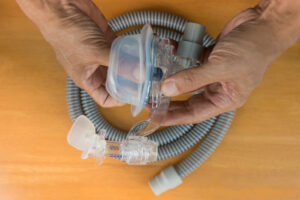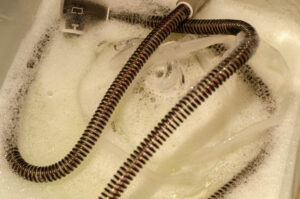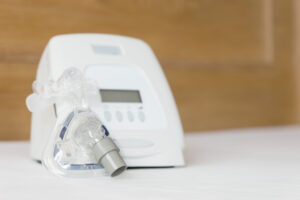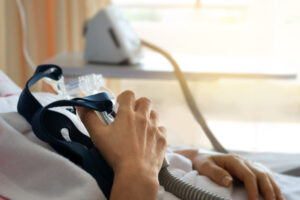A prescription from a health care provider is necessary to obtain a continuous positive airway pressure (CPAP) machine. Similar devices, such as auto-titrating positive airway pressure (APAP) and bilevel positive airway pressure (BiPAP) machines, also require a prescription.
Positive airway pressure machines like CPAP are the main treatments for obstructive sleep apnea and other breathing problems. These devices use a motorized system that pumps pressurized air into the airways to keep them open. Air moves from the device through a tube connected to a mask worn over the nose and mouth or just over the nose.
Why is a Prescription Necessary?
The U.S. Food and Drug Administration (FDA) has classified CPAP machines and other positive airway pressure delivery systems as Class II devices that require a prescription for use. The FDA regulates and classifies medical devices based on how much supervision is needed to make sure they are used safely and effectively.
Requiring a prescription for CPAP ensures that people work with a doctor or other health care provider while undergoing their treatment. Health care professionals can monitor and tailor CPAP treatment so that it provides the most benefit.
Assessment of Sleep Problems
While obstructive sleep apnea (OSA) is a common cause of poor sleep, other disorders can also lead to sleep issues. The American Academy of Sleep Medicine recommends that a health care professional who is familiar with sleep medicine evaluate people with sleep complaints.
Obstructive sleep apnea occurs when the muscles in the upper throat relax and repeatedly block the airway during sleep. People with enlarged tonsils or a smaller-than-average airway are also at risk for OSA.
Nighttime symptoms of OSA include snoring, periods where breathing stops, and gasping when breathing resumes. In the daytime, OSA may lead to drowsiness and irritability, which may interfere with quality of life.
When health care providers suspect someone has obstructive sleep apnea, they often order a sleep study. A sleep study can be conducted in one of two ways.
- Sleep lab: Testing in a sleep lab or clinic is necessary if the doctor suspects other sleep issues in addition to OSA. To lower the chance of a misdiagnosis, testing in a lab is also important for people whose jobs may impact public safety, such as bus drivers or airline pilots.
- Home test: Testing at home with a portable device is an appropriate choice for some people. A doctor may order a home sleep study if they think someone could have obstructive sleep apnea without any other disorders.
Navigating CPAP Treatment
Your health care provider assesses your individual needs in order to make important clinical decisions about starting and maintaining CPAP therapy.
- Rule out safety issues: Before you begin CPAP, a health care provider will ensure that you have no contraindications, or reasons why CPAP could be unsafe. These include severe lung disease, a collapsed lung, and severe nausea and vomiting.
- Select the right equipment: While first-line treatment is usually a CPAP machine, some people benefit from devices that have changing, rather than continuous, levels of pressure. Your health care provider can select the most appropriate device for you.
- Fit a mask: A health care provider can help you choose the right mask for use with your CPAP machine. A mask that leaks or is uncomfortable may interfere with your treatment.
- Determine pressure settings: Many CPAP machines require selection of pressure levels, which is called “titration.” This may be done during a sleep study. A health care professional estimates the best level of pressure to eliminate apnea, snoring, and awakening during sleep.
- Troubleshoot side effects and problems: Many people have trouble getting used to their CPAP treatment. Communicate any problems or side effects to your health care provider. They can help make using CPAP more comfortable so that you’ll use it consistently.
- Assess and refine treatment: If CPAP treatment is not as effective as expected, your doctor may check the data from your CPAP machine or ask that you return to the sleep lab for adjustments to your treatment.
How to Get a CPAP Prescription
If you believe you have a problem that could be helped with CPAP, start by talking to a health professional. Be sure to mention any symptoms you experience, such as waking up gasping for air or feeling sleepy during the day. If you sleep with or near someone else, share their observations as well, especially if they notice things like snoring.
If your health care provider suspects OSA may be causing your symptoms, they may refer you to a sleep specialist. Sometimes they will order a sleep study themselves. A sleep study is necessary to confirm a diagnosis of obstructive sleep apnea. Based on the results of your sleep study, they may prescribe CPAP.
Where Can You Purchase or Rent a CPAP Machine?
If CPAP therapy is prescribed for you, you can obtain a CPAP machine and accessories in a number of ways. The best way may depend on what your health care provider suggests and what your insurance provider will cover.
- Sleep clinics: Some sleep labs or sleep clinics may be able to provide you with a CPAP machine, in addition to performing sleep studies.
- Medical supply stores: Brick and mortar medical equipment stores provide CPAP machines and equipment.
- Internet suppliers: Many online vendors sell or rent CPAP machines and offer a wide range of styles, features, and accessories.
Some people purchase CPAP machines, while other people rent them. You can check whether your insurance provider works with the supplier you’ve selected and whether your insurance policy covers CPAP rental or purchase. You can also call the number on your insurance card to make inquiries.
Additionally, you may ask the supplier’s insurance coordinator or billing department whether they accept your insurance.
Is CPAP Covered by Insurance?
CPAP devices may be covered by insurance if certain conditions are met. If your health care provider prescribes CPAP, health care insurance will cover some of the cost of CPAP equipment under some circumstances. Some coverage providers, such as Medicare and Medicaid, require your diagnosis to meet certain guidelines.
Additionally, as a condition of continuing coverage, some insurers check to see that you use your CPAP as prescribed. For instance, some may require data from your CPAP machine that proves you have used your machine at least four hours a night at least 21 nights a month.
If you do not have insurance, you can choose to rent or purchase a CPAP machine on your own, as long as you have a prescription. Sometimes people who have insurance opt to pay for CPAP machines or accessories out of pocket. This may cost less, provide more freedom of selection, and protect their privacy by freeing them from certain insurer requirements.
References
Get Your Sleep Questions Answered Live on 4/30
Have questions about sleep? Get all your sleep-related questions answered in a Live Q&A on YouTube with renowned sleep expert Dr. Michael Breus at 5 p.m. PST/8 p.m. EST.











